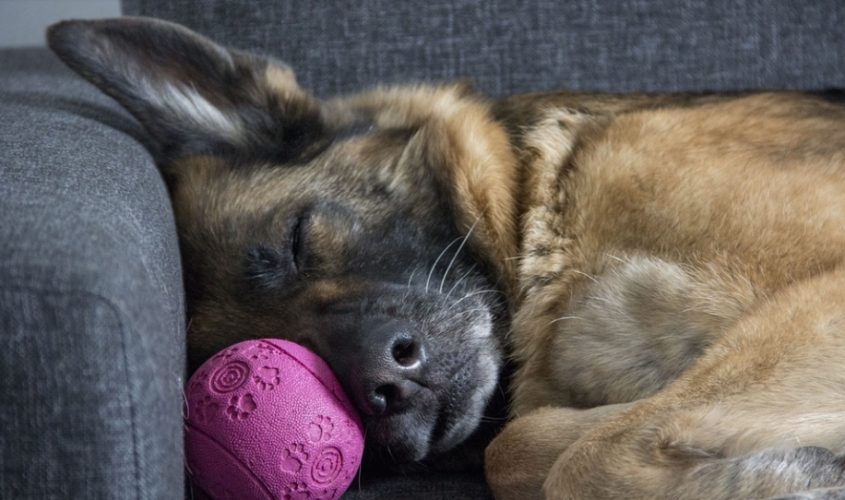Dog Barking in Sleep – Understanding Dog Behavior
Have you ever thought that a dog barking in sleep is a normal occurrence? Dogs are similar to humans when they sleep because they also dream and make sounds. Barking is one of the sounds that dogs make while sleeping.
To understand why dog barking in sleep happens, let’s dig deeper into the topic through this article.
Dog Barking in Sleep: Why Does It Happen?
Dogs can be avid dreamers too. And when they dream, it can sometimes manifest in their movements and sounds. For example, when a dog dreams of running, its legs may also twitch on the bed. Likewise, a dog barking in its sleep may be barking in the dream, too.
Dog dreams can be all sorts of things. Thus, the sounds may also range from standard barking to painful whimpering and even hateful growling. When in slumber, dogs may have pleasant dreams or terrible nightmares.
Small Breeds vs Large Breeds
As a pet parent, it might get annoying to wake up at night thinking that there is a stranger in your home or something wrong with your pooch. You get up, and yet you find it in deep sleep. However, you might find that not all dogs bark in their sleep despite being in a dream. A dog’s age and breed also influence its dream cycle.
Smaller dogs tend to dream a lot more than their bigger counterparts. Hence, if you currently have a puppy or a small dog breed, then expect that they dream more often, albeit shorter. Small dogs are said to dream every 10 minutes approximately. Meanwhile, larger breeds may dream for every 90 minutes or so. Thus, there is a significant difference in the movements and sounds that small and large dogs make.
Understanding a Dog’s REM Cycle
What is a REM cycle, and how is it related to a dog barking in sleep?
When dogs sleep, they enter into a deep REM cycle and begin their journey to dreamland. REM is an acronym for Rapid Eye Movement. REM is the stage in sleeping where the brains of both humans and animals are most active.
A dog may fall into REM sleep around 20 to 90 minutes after sleeping. This stage may last for about 10 minutes, where a dog can dream for the same duration. Since the dream can be about anything, the dog may bark in its sleep during this 10-minute REM sleep.
Some experts claim that dogs may have at least 4 to 6 dreams at night!
Should You Wake Up a Dog Barking in Sleep?
Pet parents may find barking while sleeping alarming. While your concern is understandable, it is not warranted. A dog barking in sleep is perfectly normal and should not worry you. Even if the dog is having a nightmare, you should just let it be. Waking it up in the middle of a dream may only disrupt the sleep cycle and startle the poor dog.
If the barking is too much for you to handle at night time, try putting the dog bed in a room that is far away from your bedroom. This will help limit the barking volume, and hopefully, you can still get your good night’s sleep after. Also, make sure that your dog does not go to bed hungry or uncomfortable as this might cause nighttime barking, too.
Sometimes, sleep barking can get excessive. If you believe that there is more to it than just dreams, bring your pooch to a trusted veterinarian. The vet will assess the dog and help determine the root cause of the barking.
Other Normal Things Dogs Do When Sleeping
A dog barking in sleep is normal. But, it’s not the only thing that is. The following behaviors are normal for a sleeping pooch as well:
- Slight whimpering and growling, which may be caused by a nightmare
- Snorting and grunting, which may indicate they are smelling something in a dream
- Licking and chewing, which can mean they are dreaming of eating
- Howling, which can be a sign of a nightmare or dreaming of hunting and tracking activities
Actions that are considered normal for a sleeping pooch are the following:
- Head movements
- Sniffing
- Increased in breathing (not too severe)
- Twitching of ears or legs
- Leg movements that are similar to running
- Turning in their sleep
- Wagging of tail
- Flickering of eyes
Time to Wake Up the Pooch!
Of course, letting your dog sleep despite the barking is good. However, you should also know when to wake your furball up. Waking canines that are sleeping is essential when you notice the following behaviors:
- Uncontrollable body movements
- Panting or difficulty breathing
- Painful whimpering
When dogs do the above things in their waking and sleeping time, something is bothering them. Consult with a vet immediately so that proper assessment and diagnosis can be done. Prompt treatment may be essential to ensure that your dog is safe from any life-threatening conditions.
Take caution when you wake up the dog. Dogs can get startled, too, and they may become aggressive or violent. They may unintentionally bite the person who woke them up without meaning to do it. If ever you need to wake the dog, wake it up by calling its name. Using your voice is better than physically touching it to wake up.

When Dog Barks at Night while Awake
Nighttime barking is irritating, for the people in the household and the neighbors, as well. Dogs that bark at night while awake mean that they cannot sleep. They either bark just to get your attention, or perhaps something is making them uncomfortable.
When dogs are in distress, they cannot tell you directly how they feel. Thus, they communicate through barking. Get up and check your dog. Is it feeling uncomfortable? Is it in pain? Is it hungry? Is it in distress? Several problems can cause dogs to suffer from insomnia just like in humans.
Sometimes, the condition of the environment also affects your dog’s sleep. Make sure that the bed is still comfortable for it to sleep in. Also, do not forget to feed your dog or take it out for a nighttime pee/poop before bedtime.
Conclusion
Pet parents should never fear dog barking in sleep. This is a very normal thing as dogs dream in their sleep. It is best to let the dog continue sleeping and not wake it up. Similar to humans, dogs find it bothersome if someone wakes them up from a peaceful slumber too. So, be a good parent and just let your dog sleep.
However, you need to monitor your dog from time to time if barking is accompanied by other worrisome signs such as severe difficulty in breathing, whimpering caused by pain, or uncontrollable body twitching. These signs may indicate that something is wrong with your beloved pooch. If you witness these signs while your dog is asleep or even during its waking hours, consult the vet immediately. A proper treatment might be needed based on the vet’s diagnosis of your dog’s condition.

